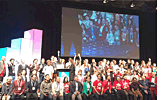Innovation
Hacking Health collaborates with research orgs
June 21, 2017
 TORONTO – Hacking Health Toronto (#hackmentalhealth) was held in early June in conjunction with the annual e-Health Conference and Tradeshow, at the Metro Toronto Convention Centre. The hackathon collaborated with the Canadian Institutes of Health Research (CIHR) and the Mental Health Commission of Canada (MHCC) to tackle one of Canada’s most pressing challenges: workplace mental health and wellbeing.
TORONTO – Hacking Health Toronto (#hackmentalhealth) was held in early June in conjunction with the annual e-Health Conference and Tradeshow, at the Metro Toronto Convention Centre. The hackathon collaborated with the Canadian Institutes of Health Research (CIHR) and the Mental Health Commission of Canada (MHCC) to tackle one of Canada’s most pressing challenges: workplace mental health and wellbeing.
The goal of the hackathon was to develop innovative, evidence-informed, gender-responsive and culturally appropriate, digital mental health solutions that foster the labour-force participation of women, men and gender-diverse people at risk of or struggling with workplace stress or mental health injuries.
Hacking Health has encouraged the participation of technology companies in the past, but the participation of large research organizations was something new.
“This was a first for the industry, and was very promising in terms of increasing the impact of collaboration among healthcare providers, researchers and enterprises,” said Luc Sirois, co-founder and lead of Hacking Health. (http://hackinghealth.ca/)
The winners of the hackathon were:
• Scalability Award
Winning Team: Wellcome
Researchers: Rupa Banerjee & Leslie Nichols
Short description: Mental support application for precarious and unemployed workers
Award Sponsor: Interac
Summary of Award: $1,000 for the team
• Healthier World Award
Winning Team: Take Your Break
Researchers: Tamara Daly
Short description: Supporting the mental health of long term care workers
Award Sponsor: Gevity
Summary of Award: Management consulting services customized to your project needs (valued at $10,000)
Additional award: People’s Choice – Muse Headbands for all team members + free Vancouver eHealth 2018 registration for project leads
• Design Award
Winning Team: Well Link
Researchers: Maureen Drysdale
Short description: Fostering well-being, stress reduction, and sense of belonging during critical transitions to full-time work
Award Sponsor: Cossette Health
Summary of Award: 1:1 matching contribution for any investment made with Cossette Health post-hackathon
• Technology Award
Winning Team: CogNeat
Researchers: Sylvie Grosjean
Short description: Taking control of digital stress in healthcare settings
Award Sponsor: Bizagi
Summary of Award: Tech baskets for all members of the team
• Design Award
Winning Team: Wiiji
Researchers: Vicki Kristman
Short description: E-health interventions for Indigenous mental health in the workplace
Award Sponsor: Cossette Health
Summary of Award: 1:1 matching contribution for any invesntment made with Cossette Health post-hackathon
• Design Award
Winning Team: Instead
Researchers: Kelly McShane & Harry Dearden
Short description: Addressing the burden of addictions on the workforce with e-tool solutions
Award Sponsor: Cossette Health
Summary of Award: 1:1 matching contribution for any invesntment made with Cossette Health post-hackathon
• Impact Award
Winning Team: Ripple
Researchers: Sandra Moll
Short description: Building accessible mental health literacy training and supports for under-resourced health care workplaces
Award Sponsor: Desjardins/Hacking Health
Summary of Award: FitBits for team members
• Innovation Award
Winning Team: Hard Hat
Researchers: Jian Li Wang & Mona Ahmed
Short description: Developing an e-mental health program for prevention of major depression in workplaces
Award Sponsor: Orion Health
Summary of Award: Up to 8 hours of advisory support with Chief Medical Officer
• Design Award
Winning Team: Open Door
Researchers: Allison Williams
Short description: Role strain support for caregiver employees through digital solutions
Award Sponsor: Cossette Health
Summary of Award: 1:1 matching contribution for any invesntment made with Cossette Health post-hackathon
Work stress and mental health are pressing challenges for much of the Canadian workforce. Nearly 40% of long-term disability claims in Canada are related to psychological health.
According to Hacking Health, the changing demographics of the Canadian workforce mean that we require new and innovative ways to foster and support a healthy and productive workforce now and in the future.
